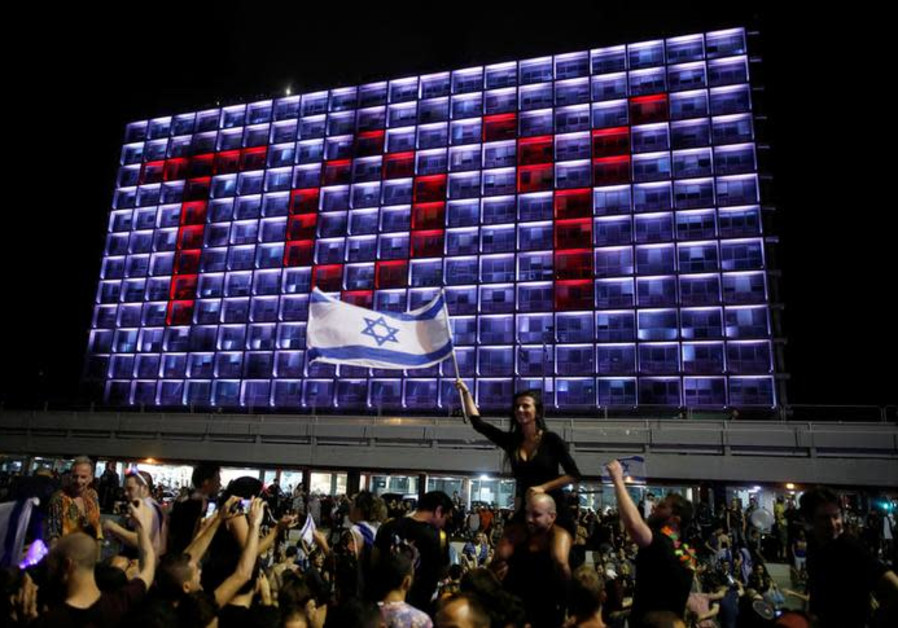 TEL AVIV TO HOST EUROVISION 2019
TEL AVIV TO HOST EUROVISION 2019
AMY SPIRO
Culture Minister Miri Regev says she had hoped the contest would be in Jerusalem, but she has no doubt that Tel Aviv will do a worthy job

The 2019 Eurovision song contest will be held in Tel Aviv.
The European Broadcasting Union announced on Thursday that next year’s competition will be hosted in the coastal city, at the Tel Aviv Fairgrounds complex, with the grand finale event to be held on May 18. The two semifinals will be held on May 14 and May 16.
“We’d like to thank all the Israeli cities that bid to host the Eurovision song contest in 2019,” Jon Ola Sand, the executive supervisor of the Eurovision, said in a video message. “In the end we decided that Tel Aviv has the overall best setup to host the biggest entertainment show in the world. We are excited to bring the Eurovision song contest to a brand new city, and are looking forward to working together with KAN to make 2019’s Eurovision Song Contest the most spectacular one yet.”
The decision, which was originally slated to be announced last week, was delayed several times. Many speculated that the delay was due to a dispute between the State of Israel and the EBU over demands that all visitors and participants be allowed entry to the country regardless of their political views.
On Thursday, Frank-Dieter Freiling, chairman of the Eurovision song contest reference group, said that “we are expecting to receive guarantees from the prime minister this week in regards to security, access for everyone to attend, freedom of expression and ensuring the non-political nature of the contest. These guarantees are imperative in order for us to move forward with the planning of the event and to uphold the Eurovision Song Contest values of diversity and inclusivity.”
Culture Minister Miri Regev said Thursday that she had hoped the competition would be hosted in Jerusalem
“As I said at the beginning, I thought Jerusalem, the capital of Israel, should host the Eurovision,” said Regev. “But from the moment that the decision was made to host the Eurovision in Tel Aviv, I had no doubt that the State of Israel and the city of Tel Aviv will host the Eurovision in the best and most worthy manner.”
Communications Minister Ayoub Kara said that he is sure that Tel Aviv and KAN “will do good and professional work and will glorify Israel’s name in the world. This is a golden opportunity to host in Israel tens of thousands of tourists and an international competition – and to do it in the best possible way.”
Tel Aviv Mayor Ron Huldai celebrated the decision, and said the city is the ideal location for the competition.
“The Eurovision is a perfect fit for our city, which has been internationally acclaimed for its vibrant energy, creative spirit, its lively cultural scene and its celebration of freedom,” Huldai said Thursday. “We are looking forward to host a joyful and nonstop event, in the spirit of Tel Aviv-Yafo!”
The municipality said that, “as agreed upon,” it “will finance the venue” that will hold the two semifinals and the final event that are all broadcasted live around the world. The municipality said it will hold the opening ceremony at the Tel Aviv Museum of Art, and that the “Eurovision Village” will be situated on the Tel Aviv boardwalk at Charles Clore Park.
The Tel Aviv Fairgrounds is a 50,000 square-meter space in the very north of the city, next to Tel Aviv University. The complex is divided into a series of pavilions, and mostly used to host conventions and conferences. The newest construction, Pavilion 2, which was completed in 2015, can host events with up to 10,000 people, and has held many concerts and sporting events.
The decision to host the competition in Tel Aviv – and not Jerusalem, the only other finalist – came after months of deliberation and public debate.
Some experts saw Tel Aviv as a less controversial host city than Jerusalem, with a lower chance of being targeted by boycott efforts. Many also saw the appeal of Tel Aviv as a gay-friendly tourist site, and the potential for holding the city’s Pride Parade to coincide with the competition.
This will be Israel’s third time hosting the competition, but the first in Tel Aviv. The 1979 and 1999 events were both held in Jerusalem.
But politics may not have played the biggest role in the decision to host the competition in Tel Aviv. The Jerusalem Municipality faced pressure from haredi groups to not host the competition, since it would involve rehearsals and events taking place on Shabbat. Even after submitting a bid to host the event, the municipality would not categorically state that it would allow events to take place on Saturday.
Zawartość publikowanych artykułów i materiałów nie reprezentuje poglądów ani opinii Reunion’68,
ani też webmastera Blogu Reunion’68, chyba ze jest to wyraźnie zaznaczone.
Twoje uwagi, linki, własne artykuły lub wiadomości prześlij na adres:
webmaster@reunion68.com
